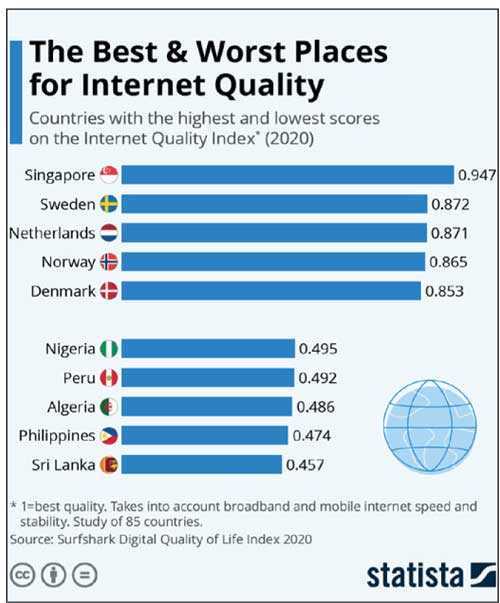Friday Feb 20, 2026
Friday Feb 20, 2026
Tuesday, 30 March 2021 01:57 - - {{hitsCtrl.values.hits}}
 Sri Lanka has been ranked as worst for internet quality among 85 countries analysed by VPN provider Surfshark.
Sri Lanka has been ranked as worst for internet quality among 85 countries analysed by VPN provider Surfshark.
Singapore tops the list. Scandinavian and Benelux countries also rank high on the Internet Quality Index which considers the speed and reliability of broadband and mobile internet connections. Canada ranks seventh ahead of the US in rank 18.
The analysis was made available by Statista, leading provider of market and consumer data.
In a supporting article on the internet quality, in a review done by Statista, data journalist Katharina Buchholz said unreliable internet can ruin a workday or a movie night just as much as it can hinder the ability of companies to go about their business or expand into innovative products. Countries with outstanding internet quality typically regard the infrastructure as an asset both for their citizens and their business communities.
According to the Asia Foundation, island nations have to shoulder more costs for internet infrastructure, leading to poorer connections in some places. In the Philippines, this first hurdle to quality internet access is met with more problems caused by bureaucratic challenges, according to the foundation. Remote places, especially islands, are often connected to the internet via satellites and not cables, which inherently reduces speed and reliability, for example because of weather.
While the Philippines ranked towards the bottom in mobile internet speed, the country fared somewhat better for the speed of broadband. In terms of the stability of these networks, the country ranked in the bottom three, explaining the poor final score on the index.
To add insult to injury, the study found that poor quality internet connections were often the least affordable. In Nigeria, which ranks towards the bottom in internet quality, the average employee has to work more than 33 hours to pay for even the cheapest monthly broadband connection – the highest in the survey.
The same trend emerges for many Latin American countries. In the Philippines, access to broadband, if available, requires more than seven hours of work at average pay per month. This makes the country the least affordable location in Asia in the survey, ahead of Pakistan and Thailand, where the average worker needs between 5.5 and 6 hours to pay the internet bill, said the report.